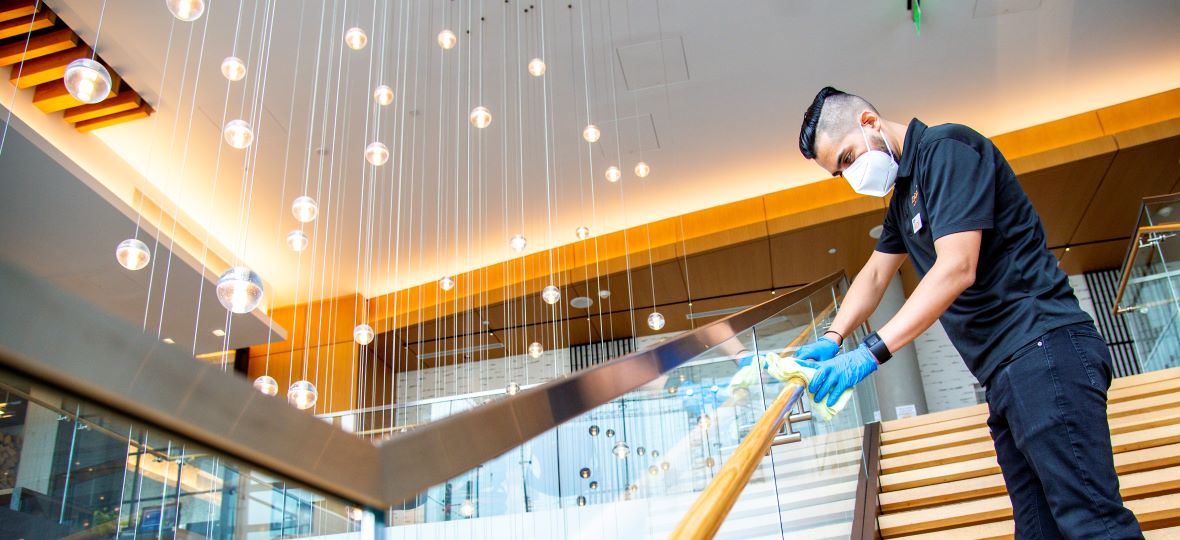Post-pandemic tourism won’t simply be business as usual, says the head of the Hong Kong Tourism Board, citing new consumer trends and fierce competition among destinations – including “intensive promotions” – to attract visitors. At the same time, Hilton has enlisted Lysol and the Mayo Clinic to help forge to begin anew with a clean slate.
HKTB chairman Dr. Y.K. Pang says the global tourism landscape will be “re-shaped” following the “global halt” of tourism caused by the coronavirus outbreak, adding that COVID-19 has created “unprecedented challenges” for the travel industry.
So, will it look like?
“In the post-pandemic world, we will see a shift in preference and behaviour among travellers,” says Yang. “The public health conditions of destinations, and the hygiene standards of transportations, hotels and other tourism facilities will become a top priority; people will prefer short-haul breaks and shorter itineraries; wellness-themed trips will become a new trend.”
As such, the HKTB is planning to “review and rethink” Hong Kong’s position in the global tourism market with the aim of mapping out a recovery plan and long-term development strategy for its tourism industry.
In the meantime, the HKTB expects long-haul markets to take time to recover with outbound travel not likely to resume before the second half of the year “at the earliest,” but notes that “consumer sentiment is comparatively more positive in Canada, France and Germany and outbound travel is expected to recover at a faster rate in these markets.”
At the same time, ethnic Asian visitors are expected to be the first to return to visit Hong Kong after the pandemic, says the HKTB.
On a broader scale, including the mainland Chinese market, the HKTB expects consumers to be more price and value conscious, focussed on health and nature, and will favour destinations that pose a low risk to health.
Regional competition amongst destinations to attract destinations will also be “fiercer than ever” prompting tourism authorities and the travel trade to gear up “intensive promotions to vie for visitors,” predicts the HKTB.
HILTON
Meanwhile, this week, Hilton revealed a first glimpse of its post-pandemic plan, introducing what it says will be “an industry-defining standard of cleanliness and disinfection in Hilton properties around the world” that will at the same time be “a first for the hospitality business.”
Designed in collaboration with RB, maker of Lysol and Dettol, and in consultation with the Mayo Clinic, the “Hilton CleanStay with Lysol Protection” program will be implemented at Hilton’s more than 6,100 properties (representing 18 brands) and include elevated hygiene protocols throughout its hotels, including guest rooms, restaurants, fitness rooms and in other public spaces.
Hilton says it is rewriting its cleaning protocols based on evolving consumer expectations during the COVID-19 pandemic, with research indicating that consumers have heightened concerns regarding hygiene on their journey, and that trust in cleanliness standards will be critical to restarting travel.
The company says the “rigorous quality assurance program” will also help protect its front-line workers.
Built on what Hilton says is its “already high standards of housekeeping and hygiene,” which include the use of hospital-grade cleaning products, new disinfection protocols will be developed based on advice and assistance from the Mayo Clinic’s Infection Prevention and Control team and hygiene and disinfection experts from Lysol.
Program possibilities and brand standards in development include:
• Room Seal: Adding an extra measure of assurance by placing a room seal on doors to indicate to guests that their room has not been accessed since being thoroughly cleaned.
• 10 High-Touch, Deep Clean Areas: Extra disinfection of the most frequently touched guests room areas – light switches, door handles, TV remotes, thermostats and more.
• De-clutter Paper Amenities: Remove pen, paper and guest directory; supplement with digital or available upon request.
• Focus on Fitness Centres: Improved guidelines for disinfecting the hotel Fitness Centre, possibly closing for cleaning multiple times daily and limiting the number of guests allowed in at one time.
• Clean and Clean Again: Increase the frequency of cleaning public areas.
• Guest-Accessible Disinfecting Wipes: Provide stations at primary entrances and key high traffic areas – for instance, a station to allow guests to wipe the elevator button before pressing.
• Contactless Check-In: Hilton will double-down on Digital Key technology for guests who desire to have a contactless arrival experience. Guests can check-in, choose their room, access their room with a digital room key and check-out using their mobile devices through the Hilton Honors mobile app at participating hotels. Hilton will continue to expand its Digital Key capabilities to common doors and access points throughout the hotels.
• Innovative Disinfection Technologies: Hilton is exploring the addition of new technologies, like electrostatic sprayers – which use an electrostatically charged disinfecting mist – and ultraviolet light to sanitize surfaces and objects.
“Our first priority has always been the safety of our guests and team members,” says Hilton president and CEO Christopher J. Nassetta. “Hilton CleanStay builds on the best practices and protocols we’ve developed over the last several months, allowing our guests to rest easy with us… while protecting our team members who are on the front lines of hospitality.”
Hilton says details of the full program will be announced soon.
RELATED STORY: Hong Kong plans for post protest, virus future

